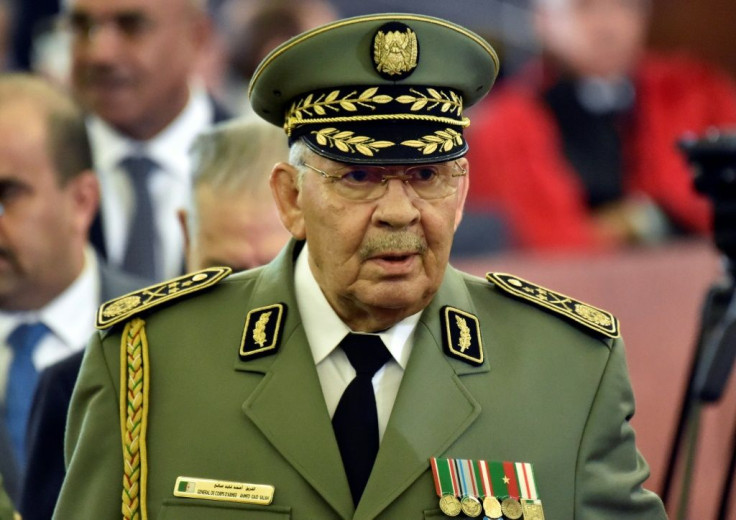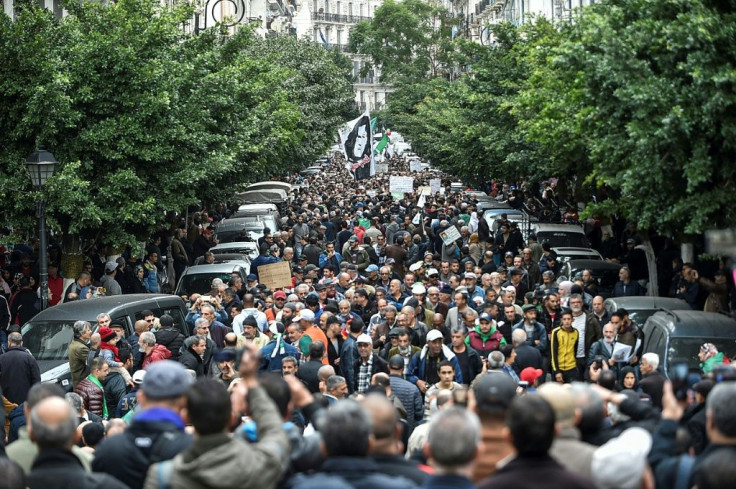Death Of Army Chief Gaid Salah Caps Turbulent Year For Algeria

Algeria's powerful army chief General Ahmed Gaid Salah died of a heart attack at age 79 on Monday, threatening to deepen the country's political crisis at the end of a turbulent year.
Gaid Salah was seen as Algeria's de facto strongman following the April resignation of longtime president Abdelaziz Bouteflika in the face of massive protests against his bid for a fifth term.
"The deputy defence minister and chief of staff of the army died Monday morning of a heart attack," the presidency said in a statement read out on state news channel Algeria 3.
The general died at home of a heart attack at about 6:00 am (0500 GMT) before his body was transferred to a military hospital, the statement said.
The lifelong military man had made his last public appearance Thursday at the swearing-in of new president Abdelmadjid Tebboune, who was seen as close to Gaid Salah.
Gaid Salah was instrumental in pushing the December 12 vote that elected establishment insider Tebboune -- in defiance of a months-long protest movement demanding deep-rooted political reforms before any poll.
At Thursday's ceremony, Gaid Salah was also awarded the rank of "Sadr" in Algeria's National Order of Merit, an honour normally reserved for heads of state.
As chief of the military for a record 15 years and a veteran of Algeria's war for independence from France, the general was seen as the guardian of the military-dominated system that has been in power since.
When Bouteflika appointed him in 2004 to head the armed forces -- the backbone of Algeria's opaque regime -- he became one of the North African country's most powerful men.
He loyally supported Bouteflika for years until the president's February announcement that he would run for re-election sparked unprecedented protests by the youth-led "Hirak" movement.
In early April, Gaid Salah called on his boss to resign. Bouteflika quit the same day, leaving the armed forces chief effectively in charge of the country.

But the old soldier categorially rejected the Hirak movement's key demands: deep reforms, the establishment of transitional institutions and the dismantling of the military-dominated regime.
Moussaab Hammoudi of the School for Advanced Studies in the Social Sciences in Paris said weeks before Gaid Salah's death that he was "not a great strategist".
"He acts like a brutal soldier," he said. "For him, Algeria is a huge barracks, and making a concession is a weakness."
His death comes as huge numbers of Algerians have continued protesting after Tebboune's appointment as president, rejecting his call to engage in dialogue.
Gaid Salah was born in 1940 in Batna region, some 300 kilometres (190 miles) southwest of Algiers, and spent more than six decades in the armed forces.
At the age of 17, he joined Algeria's National Liberation Army in its gruelling eight-year war against French colonial forces.
When the country won independence in 1962 after 132 years as a French colony, he joined the army, attended a Soviet military academy and rose through the ranks.
Gaining a reputation for a hot temper, he commanded several regions before becoming chief of Algeria's land forces at the height of a decade-long civil war pitting the regime against Islamist insurgents.
In 2004, as he hit retirement age, he was picked by Bouteflika to replace overall chief of staff Mohamed Lamari, who had opposed the president's quest for a second mandate.
Tebboune on Monday appointed land forces commander General Said Chengriha as interim military chief of staff, Algeria 3 reported.
He also declared three days of national mourning.
© Copyright AFP 2024. All rights reserved.





















